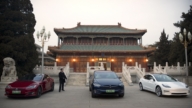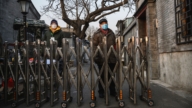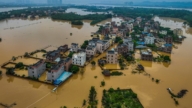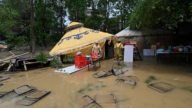【新唐人2012年2月6日讯】在第48届“慕尼黑安全政策会议”上,美国国会重量级参议员马侃警告说:“‘阿拉伯之春’也将来临中国。”这番话触动了中共的敏感神经,参与会议的中共副外长张志军竭力辩驳。外界评论指出,中共的维稳开支已超过了国防预算,结束中共专制的变革不久将来临。
参与2月4号会议讨论的包括马侃、张志军、澳大利亚外长陆克文、法国前外长巴尼耶等政要,讨论由美国前国务卿基辛格主持。
美国前共和党总统候选人马侃表示,美国虽然战略重心转向亚太,但不会放弃在中东地区的关键作用。他呼吁安理会制止叙利亚总统阿塞德屠杀平民。
4号,联合国安理会谴责叙利亚屠杀的决议,再次遭到中俄否决。在此前一天,叙利亚政府军炮击抗议民众,造成至少260位平民死亡,成为叙利亚近一年来最血腥的一天。
在4号的慕尼黑会议上,与会各方表达了对中共非民主化体制,和军力扩张对世界安全的忧虑,马侃提到了最近藏族僧侣自焚抗议中共统治的事件。
马侃:“我在很多场合都说过,并再次重申,‘阿拉伯之春’也将来临中国,而且你(中共)无法完全遏制它,因为有这些设备的传播(显示手机)。”
马侃还提到了南中国海主权争端。中共副外长张志军反驳说,维持地区和平与稳定关系到中国的切身利益,他指责美国强化亚太军事存在,制造紧张氛围,有悖潮流。
《人民网》报导,会场气氛一度充满火药味。
美国哥伦比亚大学访问学者王天成表示,中共自己欺骗自己,说受到民众的拥护,无视各种社会危机。
王天成:“它这个经济增长是以牺牲人权、牺牲公平正义为代价的,积累了很多的矛盾,实际上中国变得越来越不稳定了,政府也变得越来越腐败。在这种情况下,如果中国政府不选择政治改革的话,‘阿拉伯之春’终将会来临的。”
王天成表示,苏联、东欧剧变发生前,没有人相信强大的苏联会土崩瓦解。中共强调与今日的中东北非、昔日的苏联不一样,但却躲不过反专制的历史潮流。
王天成:“中国的政府可能会像所有的独裁者一样,相信自己的镇压能力,但是,镇压并不是任何时候都有效的,要不然的话,所有的独裁国家都会长命百岁了。当然,这一天来临的时候,可能很多人都会感到震惊。”
“阿拉伯之春”已经带给中国巨大的影响。近期,一份中共安徽省发出的维稳文件曝光,当局要求24小时监控互联网、手机短信、微博等通讯,预防重大群体性事件的发生。
北京注册会计师杜延林表示,当局高压维稳终将会使社会危机和矛盾激化。
杜延林:“以后政治变动的方式我很难预测,不一定是‘阿拉伯之春’这种方式,但是,变革是必然的,这就看执政者是不是理性的对待民众的诉求,如果他能足够理性,能够作出主动的政治让步的话,也许是一种更为温和的政治变革形式;如果是采取了卡扎菲那种方式,或另外一种更极端的方式,也许是另外一种方式。”
“全球退党服务中心”主席易蓉指出,《九评共产党》引发的退党大潮,正在从组织上解体中共,引导全民走向精神觉醒,为中国不久将来的政治变革提供了和平转型的途径。
新唐人记者秦雪、李元翰、周平采访报导。
———————
McCain: The Arab Spring Is Coming To China As Well.
On the 48th Munich Conference on Security Policy,
the U.S. Congress Senator John McCain sent out a warning.
“The Arab Spring is coming to China as well.” He said.
McCain’s talk touched the sensitive nerve of the
Chinese Communist Party (CCP)’s regime.
Zhang Zhijun, CCP’s Vice Foreign Minister,
struggled to refute the remark in response.
Outside comments review the fact that the CCP’s expenditure
on stability maintenance has exceeded it’s defense budget.
A change that indicates that the CCP dictatorship’s end
will come soon.
On February 4, the Security Conference attendees included
McCain, Zhang Zhijun, Australian Foreign Minister, Kevin Rudd,
former French Foreign Minister Michel Barnier, among others.
Henry Kissinger, former U.S. Secretary of State chaired the discussion
Former U.S. Republican presidential candidate John McCain
said the U.S. won’t give up it’s key role in the Middle East.
McCain called on the UN Security Council to stop
the Syrian President Bashar al-Assad’s massacres of civilians.
China and Russia have both vetoed the UN Security Council’s
resolution condemning the Syrian massacre on 4th February.
One day before, the Syrian army had shelled protesters,
killing at least 260 civilians. The day became the bloodiest day in Syria so far this year.
Participants of the Munich Conference on 4th Feb.
expressed much concern about the CCP regime.
The CCP’s non-democratization system and its military
expansion are causing a threat to the world.
McCain mentioned the recent self-immolations of
Tibetan monks who have protested against the CCP’s rule.
McCain said: “I have said on many occasions and I will
say it again. The Arab Spring is coming to China as well.
And there is no way that you will be able to stifle it completely
because of these devices (shows a mobile phone).”
McCain also referred to the South China Sea sovereignty dispute.
CCP vice Foreign Minister, Zhang Zhijun, refuted his comments.
Zhang alleged that, the maintenance of regional peace and
stability relates directly to China’s vital interests.
Zhang accused the US of strengthening its Asia-Pacific
military presence and of creating a tense atmosphere.
The CCP’s mouthpiece People’s Daily reported that the
meeting’s atmosphere was filled with the smell of gunpowder.
Wang Tiancheng, a visiting scholar at Columbia University,
says that the CCP regime cheats itself.
The regime touts that it is supported by the Chinese people.
Whereas In reality, it is indifferent to a variety of social crises.
Wang Tiancheng says: “China’s economic growth is costing
human rights and justice.
The accumulated massive contradictions have led to an increasing
instability, in reality. The authorities’ corruption is expanding.
In this case, if China’s authorities don’t make political reform,
the “Arab spring" will eventually arrive."
Wang says that before the fall of communism in the Soviet Union
and in Eastern Europe, no one believed the SU could fall apart.
The CCP stressed today’s Middle East is different from
the former SU, yet it cannot escape the anti-authoritarian trend that is manifesting in the Middle East.
Wang Tiancheng says: “Like any dictator, China’s government
may feel confident with its repressive power.
However, a crackdown is not effective at any time.
Otherwise, all authoritarian countries would live long lives.
Of course, when the day comes,
many people may well be shocked."
The Arab Spring has had a huge impact on China. Recently,
an official document of the CCP’s Anhui authorities was exposed.
The authorities had issued the file for the maintenance of stability.
24-hour surveillance over the internet, SMS, micro-blog,
and other communication tools are required.
The aim is to prevent mass protests and outbreaks, the file said.
Du Yanlin, Beijing-based CPA, comments that the regime’s
high-handed stability will intensify the social conflicts and crises.
Duyan Lin: “I feel it is hard to predict how politics will vary in
the future. It may not necessarily go the way of the Arab Spring.
But change is inevitable; we shall see how the regime deals
with the people’s appeals, rationally or otherwise.
If it’s rationally, making active political concessions,
it’s perhaps a mild form of political change.
If it chooses Gaddafi’s road or any other extreme ways,
that may bring China yet another change in politics."
Chairman of the Global Quitting the CCP Service Center,
Yi Rong, points out that the tidal wave of quitting the CCP
triggered by the book Nine Commentaries on the
Communist Party is disintegrating the CCP’s organization.
The movement is guiding people worldwide to head for
a spiritual awakening.
Yi Rong notes that this provides a peaceful way to make
a political transformation in China in the near future.
NTD reporters Qin Xue, Li Yuanhan and Zhou Ping


























